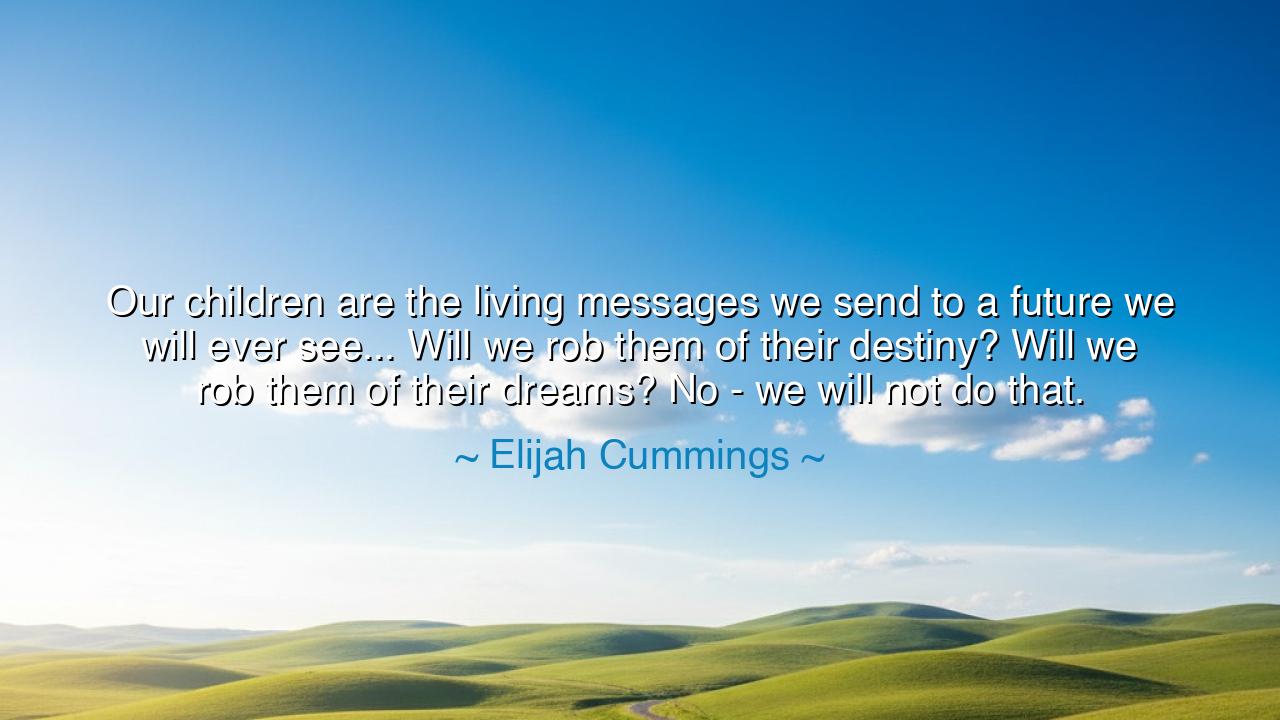
Our children are the living messages we send to a future we will
Our children are the living messages we send to a future we will ever see... Will we rob them of their destiny? Will we rob them of their dreams? No - we will not do that.






The statesman Elijah Cummings, whose voice carried both fire and compassion, once declared: “Our children are the living messages we send to a future we will never see... Will we rob them of their destiny? Will we rob them of their dreams? No — we will not do that.” These words, though spoken in the halls of power, ring like scripture across generations. They remind us that our actions today are not contained by our lifetimes; they echo forward through those who come after us. The future is not a distant land we may one day reach, but a garden tended by our hands — and our children are the seeds.
To call the young our “living messages” is to acknowledge a sacred truth: that we are all authors of time. Every choice, every law, every kindness and cruelty we enact becomes a letter written into the hearts of those who inherit the world. Cummings understood that history is not only recorded in books or monuments, but in the lives of the innocent — the children who watch what we do and become what we have taught them. His words are both a blessing and a warning: that the story of tomorrow will be shaped by the character of our generation, and that to neglect the youth is to wound the future itself.
The origin of this wisdom flows from a life devoted to justice and service. Elijah Cummings, born in the time of segregation, rose from humble beginnings to become one of America’s most respected voices of conscience. He knew what it meant to inherit a broken world and still believe in its redemption. His own parents, once denied equality, planted in him a dream that he would not live for himself alone. When he spoke of children as “living messages,” he spoke as a man who had seen both the cruelty and the courage of humanity — and who believed that the next generation deserved better than the pain of the past.
In the chronicles of humanity, this belief has appeared again and again — that the measure of a civilization lies in how it treats its young. The ancient Greeks built schools not merely to pass on knowledge, but to train the soul toward virtue, knowing that their empire’s endurance depended on the wisdom of its heirs. In Egypt, the scribes taught their apprentices to honor truth, for they understood that each pupil was a bridge between the dead and the unborn. And in our own time, leaders like Cummings echo that same ancient vow: that to raise a child in justice and hope is to ensure that the light of civilization does not fade.
The questions Cummings posed — “Will we rob them of their destiny? Will we rob them of their dreams?” — are not rhetorical. They strike at the heart of our moral duty. Every act of neglect, every system that denies equality, every silence in the face of injustice, is a theft — a theft not of money, but of possibility. To rob a child of their destiny is to plant despair where potential might have grown. And yet, the strength of his words lies in their final declaration: “No — we will not do that.” This is not a statement of fact, but a command — a vow that must be renewed by each generation that follows.
Consider the story of Nelson Mandela, who spent 27 years imprisoned under apartheid. When he emerged into freedom, he did not seek vengeance, but reconciliation. Why? Because he saw beyond himself. He said that the future of his people rested not in the bitterness of the past, but in the minds of the young. He established schools, championed literacy, and devoted his later years to protecting children from poverty and disease. Like Cummings, Mandela knew that the truest legacy of any leader is not the monuments they build, but the dreams they safeguard for those who will inherit their world.
The lesson is both simple and eternal: we are stewards of the future, not owners of it. The children of today are watching us — learning how to treat the earth, how to treat one another, how to hope. If we teach them greed, they will build a hollow world; if we teach them compassion, they will build a golden one. Therefore, let every act be done with remembrance that it will echo through them. Protect their right to learn, to play, to grow, to dream — for in protecting them, we preserve the future of all humankind.
So let Elijah Cummings’ words endure like a torch: “Our children are the living messages we send to a future we will never see.” Live so that the message you send is one of honor, of courage, of love. Let no cynicism or neglect rob the young of their destiny. For though our eyes may never see the world they create, our hands — through them — will have shaped it. And if we build wisely, with faith and care, then our unseen future will be radiant with the light of the dreams we refused to let die.






AAdministratorAdministrator
Welcome, honored guests. Please leave a comment, we will respond soon